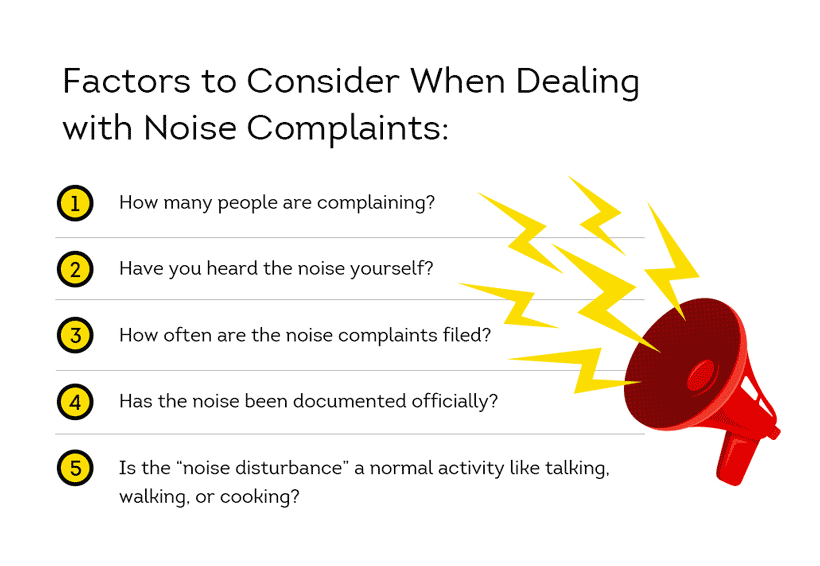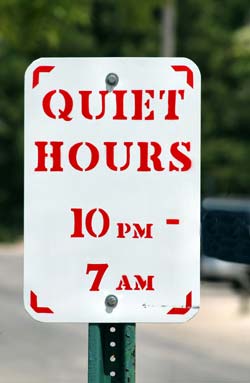Disclosure:
Remember that this material is intended to provide you with helpful information and is not to be relied upon to make decisions, nor is this material intended to be or construed as legal advice. You are encouraged to consult your legal counsel for advice on your specific business operations and responsibilities under applicable law. Trademarks used in this material are the property of their respective owners and no affiliation or endorsement is implied.
Being a landlord involves a great deal of responsibility; you’re tasked with regulation compliance, property repairs, and responding to tenant complaints and concerns.
One common problem you might face is tackling noise complaints. Landlords are held responsible for responding to and handling noise disputes that are brought up by their tenant and outside parties regarding their tenant.
Excessive noise accusations among tenants or non-tenants can be long, protracted affairs as you determine if the disturbance claim is legitimate or not.
Additionally, you might have to handle dealing with outside complaints about your own tenant.
As a landlord, you may have a responsibility to guard against excessive noise as noise can disrupt a tenant’s right to reasonable peace and quiet—if your tenant can’t get to sleep at night because of a noisy neighbor, it might be time to intervene.

Here are the appropriate steps you can take as a landlord when faced with a noise complaint.
Do Your Research – Is the Complaint Valid?
When you receive a noise complaint, clearly evaluate the situation to determine if it’s a valid complaint or one based on oversensitivity or unreasonable expectations.
Simply put, noise is everywhere. Sometimes there can be a gray area on what constitutes normal, everyday sound levels and at what point it tips into “excessive” territory.
If a tenant has decided to start his jam band practice at midnight that would be upsetting for his neighbors and likely fall under excessive noise.
But if a tenant is simply walking around upstairs and there is an ensuing footstep noise, that’s reasonable everyday noise that can’t be avoided. There are small improvements you can make such as laying down a carpet or placing pads on the bottoms of noisy moving chairs that can help to reduce some of the irritation.
However, the problem you’re confronting might not be as clear cut, so take the time to get a full understanding of the situation. This may involve gaining the perspective of each party involved.
How to Respond to and Evaluate a Noise Complaint
It’s critical to respond quickly to a noise complaint and ideally, go to the property yourself to hear and witness the issue firsthand.
A quick response can help stem overreactions. Do not ignore the tenants’ grievances; it’s important to show empathy by actively listening to their concerns. Give them an overview of their options with regard to the noise complaint and stay in touch until the issue is resolved. If a noise complaint needs to be escalated to law enforcement, be sure to follow-up with your tenant to ensure the problem was addressed professionally and in a timely manner.
Here are some other factors to consider if you find yourself tasked with evaluating a noise problem:

How many people have made noise complaints about the tenant? If multiple people are accusing one party of excessive noise, then you potentially have more evidence that lends authority to the complaints. If it’s just one person complaining, you’ll have to investigate further. This may require observing the complaint yourself.
- Have you heard the noise yourself?
Witnessing and hearing the noise is really the best way to get a sense of the situation. From there, you can choose to address the situation yourself or escalate it to law enforcement if necessary.
- How often are the noise complaints filed? Once in a while or multiple nights a week?
If multiple complaints are being lodged against your tenant or a non-tenant, it’s time to look into actionable consequences. Be sure to refer to your Homeowners Association (HOA) rules before speaking to a non-tenant about consequences. This may require getting another professional involved.
- Has the noise been documented officially? Either through you or been taken up with the police?
This adds further evidence for claims of excessive noise and gives you proper justification for any punitive actions you take.
- Is the “noise disturbance” a normal activity like talking, walking, or cooking?
This helps to delineate between noises that are reasonable and unreasonable – if a downstairs neighbor wants an upstairs neighbor to stop living their life, that’s not a feasible solution.
The answers to these questions will help to determine if the noise complaint is a legitimate issue you need to resolve or a simply a matter of setting up new standards or reiterating old ones for noise between different occupants. It will also help to determine what kinds of consequences your tenants will face for noise violations.
If the Noise Complaint is Valid
If you reach the conclusion that the noise complaint is legitimate, then you should deal with the issue promptly – whether that means directly contacting your tenant or the neighbor in question.
The worst mistake you can make when handling excessive noise complaints: ignoring it or procrastinating with your response. This could leave you vulnerable to claims of negligence and litigation in severe cases.
Make sure to explain the issue in full to all parties involved. While you’re confronting the noisy party, suggest a solution for keeping the noise down to a more appropriate level. Make sure the solution is documented and both parties are made aware. If you have official documentation of required quiet hours, you may find it helpful to refer to them during confrontation.
If the complaint is specifically regarding an upstairs neighbor from a downstairs tenant, come up with non-invasive ways to reduce those everyday life sounds. As Thebalancesmb.com explains, there are plenty of home improvements that can help you cut down on noise:
- Floor Upgrades: Tackle the floors first. Flooring choices such as cork and carpet can help reduce noise; soft and dense, these flooring options may help absorb noise before it travels through to your first-floor tenant.
Already have hardwood or laminate floors? Add area rugs to soften the area and stop the screeching of moving chairs by adding inexpensive adhesive pads to each chair leg.

- Windows: Next, move onto your windows. Installing double-pane windows may help minimize exterior noise, and could provide additional property benefits, such as enhanced curb appeal and improved energy efficiency. If you don’t want to invest in new windows quite yet, hang heavy drapes around the windows to provide a bit more noise insulation.
- Insulate: Speaking of insulation—does your rental property have extremely thin walls? Increasing wall insulation may help decrease noise between apartments.

- Tenant Behavior: You may also request simple noise control measures, such as asking your top-story tenants to use caution when closing cabinets and doors.
Living in multi-family buildings can mean a constant cacophony, but it doesn’t have to be that way. By encouraging your tenants to be considerate neighbors, you can help create a peaceful, harmonious living arrangement that suits everyone’s needs.
If the Noise Complaint isn’t Valid
If you’ve adequately researched a noise complaint but it doesn’t warrant any action, you can still calm any concerned residents and help them find closure.
For example, if a tenant was claiming that a neighbor was throwing parties all the time but in fact, it was a singular, small get-together on New Year’s Eve that resulted in an irritated neighbor. This is when you simply reiterate considerate neighbor habits while providing empathetic listening.
Let the tenant know that you’ve done your due diligence with regard to the noise complaint. Explain your judgment and decision about the noise complaint and whether or not it was warranted. If there wasn’t any evidence to back up the complaint, make sure to explain this.
Establish Quiet Hours
A great way to safeguard against issues with your own tenants disturbing others with constant excessive noise is by establishing a specification about quiet hours.
Quiet hours give tenants a guide for the time periods during which they should be extra considerate of their sound levels. For example, quiet hours could be scheduled from 10 P.M. to 7 A.M. during the weekdays but from 10 P.M. to 9 A.M. on the weekends. This doesn’t give your tenants the right to excessive noise at times that don’t fall into the quiet hour period, however.

It would also be helpful to directly state what qualifies as “excessive noise” such as loud parties, mowing the lawn during quiet hours, and blasting music.
Many towns and cities may have quiet hour laws already in place so make sure you’re aware of those pre-existing local regulations.
Prevent Problematic Tenants from the Start
In addition to establishing clear expectations on noise levels, one of your best bets for picking great tenants is by conducting proper tenant screening practices in the first place. With TransUnion SmartMove, landlords can gain quick and easy access to credit and criminal background reports, Income Insights, a credit-based ResidentScore, and eviction reports to vet applicants to make sure you’re placing the right people in your property from the very beginning.
Know your applicant.
Additional Disclosure:
For complete details of any product mentioned in this article, visit www.transunion.com. This site is governed by the TransUnion Rental Screening Privacy Policy Privacy Notice located at TransUnion Rental Screening Solutions, Inc. Privacy Notice | TransUnion.



